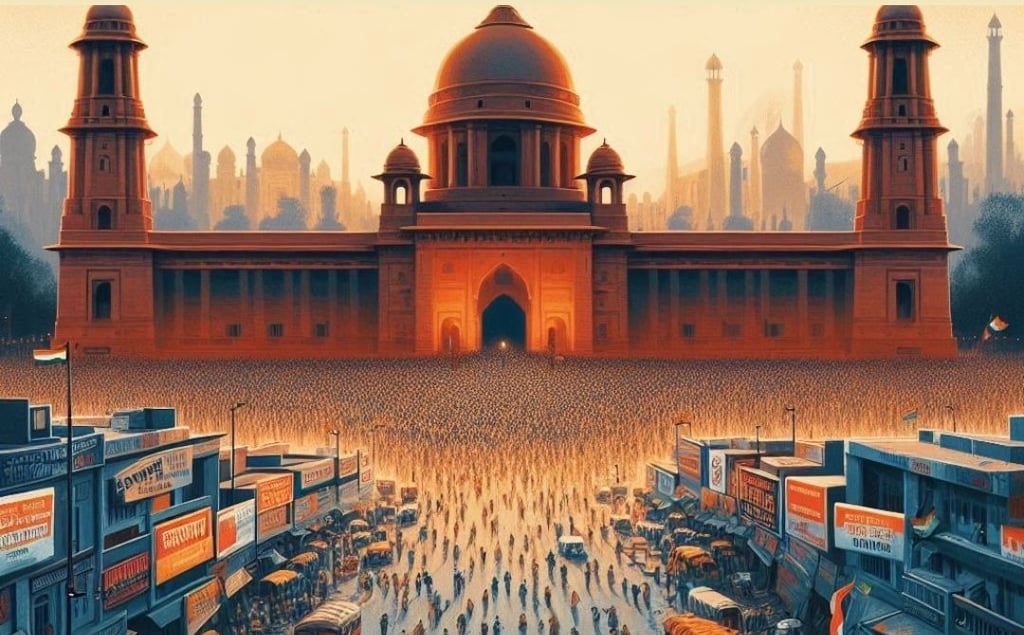From Democracy to Dictatorship?
Harshit Sagar
Campus Law Center, Faculty of Law, UOD
This blog is written by Harshit Sagar, a First-year law student of Campus Law Center, Faculty of Law, UOD


Introduction: -
India is oft hailed for having some of the most robust democratic institutions and a pluralistic society as the largest democracy in the world. However, over the last few years, one has been witnessed to a mounting concern about an incipient breakdown of its democratic system, which many believe tends to degenerate into transforming India into a dictatorship from being a democracy. While such accusations have been open to debate, the growing trends of centralization of power, suppression of dissent, and undermining of constitutional values have kept these discourses running. This blog examines the potential shift from democracy towards dictatorship in India on various aspects of democratic backsliding.
1. Centralization of Power
A healthy tenet of democracy is the devolution of powers, which ensures a system of checks and balances among the different wings constituting the government. The accusers have also claimed that the executive, under the Modi leadership, has centralized power in ways unparalleled in independent India. Decisions normally taken in consultation with states or independently by certain institutions are increasingly being made unilaterally by the Centre. The emergence of this executive dominance has shoved institutions such as the judiciary and the media to the sidelines, which is supposed to play the role of a somewhat independent watchdog. The critics point, for instance, to the judiciary as historically powerful yet increasingly vulnerable to political influence; appointments in key institutions such as the Election Commission and the Reserve Bank of India are also contentious given perceptions that they risk losing their independence.
2. Media and freedom of expression
In a well-functioning democracy, the media is free and independent, ensuring freedoms of expression. In the recent past, an ominous trend has developed: media consolidation and censorship, often to serve the interests of the government's narrative. Investigative journalism has suffered, and different voices, whether in mainstream media or digital, have been silenced through lawsuits, raids, and other judicial procedures. Several international watchdogs such as Freedom House and Reporters Without Borders, among others, reported a sharp decline in India's press freedom. The few journalists who have questioned the status quo have been harassed, or in extreme cases, suffered at the hands of violent elements. With even more government-friendly media outlets beginning to emerge, the tilt has slipped further in favour of biased public discourse.
3. Erosion of secularism
The founding principles of India were laid on the premise of secularism, wherein the state stays neutral on matters concerning religion. The recent rise of Hindutva, or political doctrine of Hindu nationalism, has shaken the secular spine of the country. Many fear that the present government is aligning itself increasingly with religious majoritarianism, sidelining religious minorities, and undermining the pluralistic identity of India. Moves such as the CAA, combined with the National Register of Citizens initiative, raise concerns on Muslims and other minorities becoming marginalized. This was further complemented by the rising impact of religion-moral discourses on politics, hate crimes, and communal violence to make it even more difficult for the state to keep its secular character.
Conclusion: -
So, in conclusion, I can say that our beloved country which used to be an example of the greatest democratic country in the world is no longer that democratic and is heading towards dictatorship. And it is in our hands to save our country by choosing our leaders wisely but not on the name of religion.
References: -
1. Resisting Dictatorship, One Video at a Time - https://m.thewire.in/article/media/resisting-dictatorship-one-video-at-a-time
2. https://youtu.be/Y9253_M38Xk?si=ogE5HJiZ2_8a08Na
4. https://www.aljazeera.com/opinions/2024/4/15/modis-elections-or-dictator-aladeens-olympics
